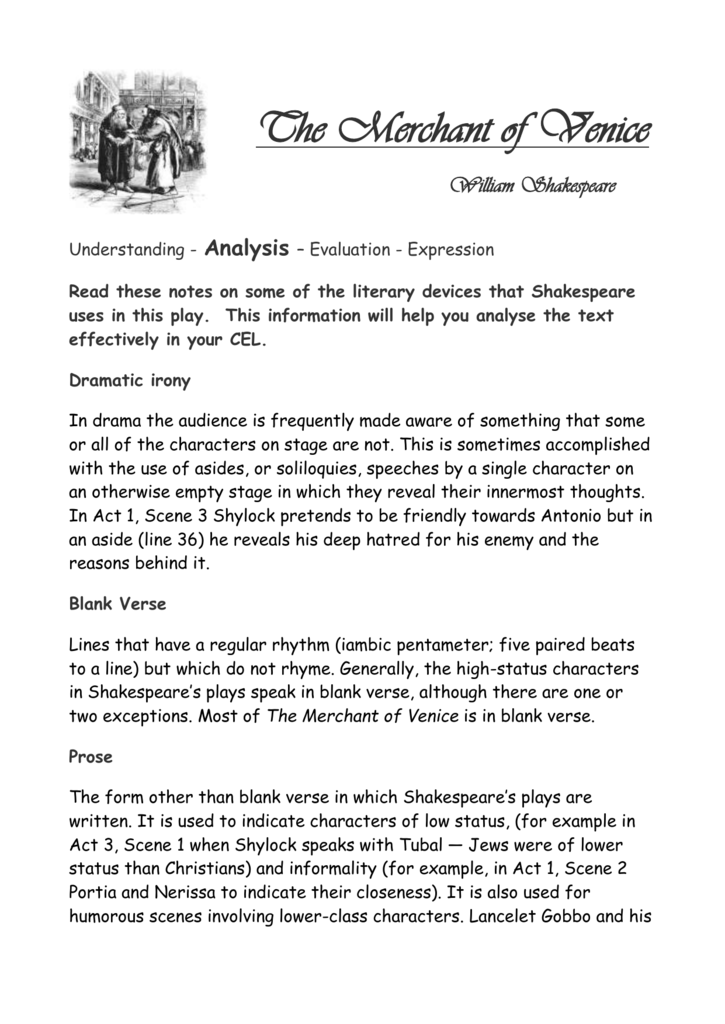The Merchant of Venice and Woman The play “The Merchant of Venice” was written in the 16th century. According to Veniceorg, “The ideal Venetian woman was quiet, subservient and focused on the home- her role was to manage the home and family. She rarely ever left and was identified through her relationship to her male relatives May 16, · The Merchant of Venice continues to be a controversial play. Despite the Shakespearean genius that floats through it, there have been countless debates on its anti-semitic references. Themes of prejudice, intolerance, and usury entangle with the topical setting of the city of Venice to create an anti-semitic vibe Essay on merchant of venice Words | 6 Pages. The Merchant of Venice The play, ¡°The Merchant of Venice¡± by William Shakespeare has two main settings. One setting is Venice, a city where many businessmen live, a place, full of unhappy and unkind people. It a world of commercial and law
Merchant Of Venice Essay Examples - Free Research Papers on blogger.com
Examine the courtroom scene in The Merchant of Venice. How does it illuminate the play's major themes? This argument mirrors several smaller disputes and personal crises throughout The Merchant of Venice. By placing the conflict at the center of his play, Shakespeare suggests that the pains of sacrifice are inescapable, merchant of venice essays. It is human to resent, and it is human to forgive.
The courtroom scene enacts a crisis all humans must someday face: whether to pardon an enemy or insist on revenge. Portia speaks on behalf of mercy, arguing that we must always forgive one another because we are constantly hoping for our own share of forgiveness from an all-knowing God.
On the other hand, Shylock represents the all-too-human desire for justice. Invoking the supremacy of justice, she says he may have a pound of flesh but not a drop of blood, with the threatened penalty of death if he does not follow her terms exactly.
Mercy and justice—forgiveness and vengeance—spar relentlessly in this climactic scene. Shakespeare has laid the thematic groundwork for his climax by repeatedly noting the virtues of a merciful way of life, merchant of venice essays.
Portia forgives Bassanio for leaving Belmont on the night of their engagement, putting aside her own wishes and encouraging him to help his friend.
Jessica and Lorenzo repeatedly note the necessity of good humor; it is in the nature of lovers to merchant of venice essays and to make false promises, so we must try to laugh and see what is best in one another. Each of these characters acts as an occasional spokesperson for the mild-mannered, magnanimous approach to life. Despite his constant sacrifices, Antonio becomes irritating when he seems to brood on his sense of perpetual martyrdom, merchant of venice essays, and Gratiano urges him to abandon his silent grievances and enjoy his life.
Long before the courtroom scene, Shylock embodies the human desire for revenge, asking why he should cooperate with Antonio when Antonio has ignored him and called him a cur. The Prince of Arragon seems absurd when he claims Portia on the grounds that he deserves her, and the message in the silver casket rebukes him for thinking that we are ever naturally entitled to happiness.
By pitting mercy against justice in his climactic scene, Shakespeare suggests that everyone struggles with competing urges to complain and forgive. Shylock demands the flesh the law has promised him, and Portia argues merchant of venice essays the world is too complex to be governed by rigid laws. Portia, Antonio, and Lorenzo all occasionally look past their own problems and behave generously, whereas other characters cannot overcome a gnawing sense of grievance and injustice.
In five tolerant, effortless acts, Shakespeare shows us that we are destined to have these arguments—with others and with ourselves—every day of our lives. Ace your assignments with our guide to The Merchant of Venice!
Looking for homework help that takes merchant of venice essays stress out of studying? Sign up for our weekly newsletter! Search all of SparkNotes Search Suggestions Use up and down arrows to review and enter to select. Plot Overview Key Questions and Answers What Does the Ending Mean?
Character List Shylock Portia Antonio Jessica Bassanio. Themes Motifs Symbols Plot Analysis Protagonist Antagonist Setting Genre Style Point of View Tone Foreshadowing Key Facts Is Shylock a Villain?
Important Quotes Explained Quotes by Theme Merchant of venice essays Wealth Prejudice Revenge Love Quotes by Section Act I, scenes i-ii Act I, scene iii Act II, scenes i-iv Act II, scenes v-ix Act III, scenes i-ii Act III, scenes iii-v Act IV, scene i Act V, scene i Quotes by Character Portia Shylock Antonio Bassanio Jessica. Previous section Suggested Essay Topics. The Merchant of Venice SparkNotes Literature Guide EBOOK EDITION Ace your assignments with our guide to The Merchant of Venice!
Popular pages: The Merchant of Venice, merchant of venice essays. Take a Study Break.
The Merchant of Venice - Prejudice (GCSE AQA Essay Help)
, time: 32:54Free Merchant of Venice Essays and Papers | Help Me

Essay on merchant of venice Words | 6 Pages. The Merchant of Venice The play, ¡°The Merchant of Venice¡± by William Shakespeare has two main settings. One setting is Venice, a city where many businessmen live, a place, full of unhappy and unkind people. It a world of commercial and law Mar 18, · The Merchant of Venice is a sixteenth century play composed by William Shakespeare in which a merchant in Venice (Antonio) must default on an extensive credit given by a Jewish moneylender, Shylock. It is accepted to have been composed somewhere in the range of and Merchant of Venice: Portia Essay Words8 Pages The Merchant of Venice is a play set in a very male and Christian dominated society where other religions and women rights weren’t very well accepted by the community

No comments:
Post a Comment